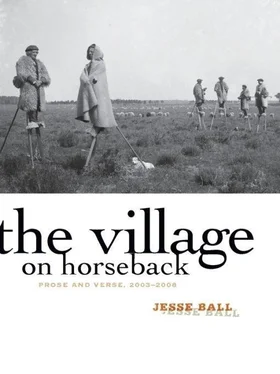changes himself into a large gold vase. His sons
become a pair of gold grates (for a confessional). Their
children become lockets. The royal servants
take the form of forks and spoons. This is general
throughout the population, and the objects
become a sort of faux-history, where each object
fails in its attempt to mimic the life lived.
Historians today wonder if this was intentional.
These pregnant methods, cheerful
and fat, leaning from filthy casements
in the side of June may yield
ink-eyed marionettes so lovely
that their gestures,
pointedly describing strings,
mean little even to the adept.
Mary. Isa. Joan. Celeste.
Roaming the grounds
of this quartered preserve.
Mary lays a lacquered hand
upon your cheek. Joan’s plain head
inclines — she is speaking
but the voice is from above.
Isa crouches in the near future;
she will scream at a painted boar
that bursts from a stand of trees.
Celeste is absent. Or is Joan
speaking of her when she says,
“I knew a matchstick once
that burned like the hands of a clock.”
From the scenery then, a wooden creaking
as of someone’s descent. Applause.
Applause. And in the front row
a man’s heart bursts in his chest.
The forest was much larger than anyone had previously thought.
So large that one couldn’t find one’s way back.
Luckily there were many lovely clearings and crisp glorious mornings.
It was therefore possible to live.
Also there were rose bushes everywhere, each larger than the one before
(and how we loved to discover the roses, naming them after ourselves).
And biplanes would pass overhead.
In the period before I entered the forest, I thought
that there was the world, one small corner of which
was the forest. Now it has become clear to me—
there is the forest, and the world is but
one small corner of it, exceedingly small, humble even.
For I have seen them meet in the street, and I can tell you
it is the world that makes the deeper bow, the world
that goes away, hat in hand, making furtive glances back
to see if the forest has turned also to look. Which never happens.
And furthermore, one can’t find one’s way back.
Luckily there are many lovely clearings and crisp glori ous mornings.
On one such morning I went out looking
for the clearest of seven streams. Seven there were,
running through the forest, and all of them clear.
Which was the clearest?
I put my hand in the first stream.
My hand turned the color of the night sky, which is mottled.
This distressed me, so I put my hand in my pocket.
On to the next stream.
I put my other hand in the second stream.
It soon began to move of its own accord.
This distressed me further. With a stern act of will
I put it too in my pocket.
On again.
At the third stream, a man was standing.
Both of his hands were stuck in his pockets also.
“What do you suppose we do next?” he asked.
The forest is different than was supposed.
It is darker in the trees, lighter between them.
Passing between them is its own skill,
separate from the skill of being in clearings.
This is how it goes: you wander for years
in the world, then you find the edge of the forest.
You enter, and wander for days in the forest.
You try to find your way back.
Instead you find a clearing. Also you find out
whether or not you can live alone in the forest.
Many can’t. Others come after, and bury them.
Hungry little roses grow then from the ground.
We of the forest wonder often about the biplanes.
From where do they take off?
Where do they land?
It should be easy to answer this question,
as there are so many of us asking it and spending time
wondering and musing.
The trouble is, only one person ever saw the biplanes.
He mentioned it in passing. Afterwards,
he refused to speak of it. Otherwise, he was silent.
If you happen to see a biplane, you’d tell me, wouldn’t you?
one of my friends asked me.
Of course I would, I say. But I’m not sure of it.
I’m not sure I wouldn’t follow the plane alone to the land- ing field
(which must be a clearing deeper in the forest)
there to make friends with the aviators, and beg them to take me in.
Such a life it would be to fly in the air above the forest!
Distinctly I feel above the forest, luckily it is always gloriously morning.
And in a plane, one can easily find one’s way,
though not, of course, back to the world. One could,
I mean, find one’s way deeper into the forest.
What can I tell you about the forest
that you can’t read in books? Well,
our lives here are bared like the trunks of trees.
We believe fundamentally in things that are
quite obviously not true. On such things
our happiness is often based.
For instance, the allegiance of friends.
We of the forest are known cowards.
We make free with each other’s possession,
make love to each other’s husbands and wives.
At first it is odd, I know.
Pierre for instance, has a gorgeous wife.
She wears a little dress of leaves. People are forever
pulling at it as she curtsies by on her girlish legs.
One day she asked me if I would like
to go and find the Monumental Rose.
Where is it? I asked.
Deeper in, she said. We really must be going.
And so we went. I took Pierre’s name.
He took mine. We shook hands.
Have a fine time, he said. Be good.
The forest is much larger than you think.
THEN — a rustling of leaves. Cora had gone.
I’d better go, I said, following into the rustling
through the glorious light.
The philosophers who end up in the forest
stop writing books and begin instead
trying to grow herb-gardens. Every time
it happens the same way. It’s so funny.
There’s Spinoza. What’s he doing? Pruning oregano.
There’s William James.
What are you doing, William James? I inquire.
But he doesn’t answer, so absorbed is he
in laying string for vines. I watch for a minute,
standing fast by his elbow, intent on his progress.
Before you go, he says absently,
be sure to take a sprig of parsley for your buttonhole.
This I do. Need I say it twice?
We of the forest are terribly dashing.
Everyone in the forest has the same dream every night.
We sleep and are immediately awake again
in a tiny one-room house. There is a storm
in the out-of-doors. It is clear to everyone
that it is the biggest storm there’s ever been.
The forest, in fact, has been flattened.
All of a sudden, the storm halts.
We rush out of the cottage door
and are standing in the middle of a clearing
that stretches infinitely in every direction.
It’s then we realize that the forest
has not been flattened. Nor was there
a storm. Merely that
this is a deeper clearing, one we may
someday find. We wake then, invigorated,
Читать дальше












